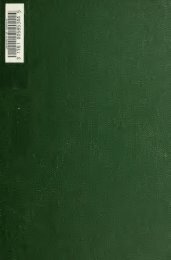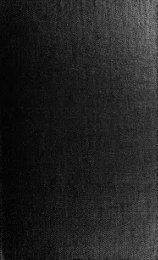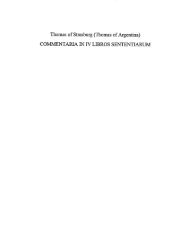Create successful ePaper yourself
Turn your PDF publications into a flip-book with our unique Google optimized e-Paper software.
XXX INTRODUCTION.<br />
i<strong>de</strong>ntified with the bread, 'impanated'; still less, become an acci<strong>de</strong>nt<br />
(pp. io3— 110). The same objection as before noticed recurs: is the<br />
world Christ's Body? Wyclif consi<strong>de</strong>rs it pru<strong>de</strong>nt to believe Scripture<br />
and go no farther. Perhaps, after the Judgment, all things will be<br />
Christ — figuratively. As for bilocation, he <strong>de</strong>nies its possibility; the<br />
same thing cannot be in two places at once. St. Ambrose could not<br />
have been at St. Martin's funeral and at Milan at the same time.<br />
Can the soul be at once in several places? It is doubtful; at any<br />
rate, matter cannot. True, great doctors have thought differently; but<br />
they have also contradicted one another. Wyclif's rule is to reject<br />
any proposition, not only when manifestly absurd, but when not<br />
proved by reason or revelation to be true. For that second reason,<br />
he would <strong>de</strong>ny that the soul can exist in two places at once (pp. 110<br />
to i 1 5). But, it is objected, is implies i<strong>de</strong>ntity between subject and<br />
predicate. Anything then would be i<strong>de</strong>ntically Christ, since everything<br />
is Christ figuratively. Wyclif answers, admitting generic but <strong>de</strong>nying<br />
numerical i<strong>de</strong>ntity; the latter would be a = a, so that there can be no<br />
possible difference between the two. But Baptist is Elias, in so far as he<br />
represents him: no farther. The lowest <strong>de</strong>gree of this i<strong>de</strong>ntity<br />
is that<br />
given by natural signs, as smoke signifying fire; the next, by a supernatural<br />
institution, as the Paschal Lamb; the highest, by the miraculous<br />
coexistence of the thing signified; which is the Eucharist (pp. i i 5—<br />
1 18).<br />
I confess I do not see how, in Wyclif's theory, this coexistence is<br />
miraculous; but the unanimous language of the early Fathers whom he<br />
so much esteems, seems to have <strong>de</strong>termined him to bring in a miracle.<br />
Ch. X. A fresh <strong>de</strong>bate commences here, on the essence or<br />
quiddity of the Sacrament; with, however, few points<br />
that have not<br />
been touched upon already. The exceptions are: I st the statement that<br />
when an acci<strong>de</strong>nt is the subject of other acci<strong>de</strong>nts, it necessarily<br />
becomes a substance (p. 121); which Wyclif might have <strong>de</strong>veloped into<br />
a much better and stronger argument; and, 2 nd the answer to an<br />
objection taken from St. Thomas, concerning the Eucharistic fast. If<br />
the bread remains, how can a priest say two Ma'sses in one day,<br />
since he must say the second fasting? The difficulty is so weak that<br />
it is surprising Aquinas should have ma<strong>de</strong> use of it; but Wyclif<br />
avails himself of the occasion to say boldly that the great point is<br />
to fast from sin (pp. 1 23 — 124).

















